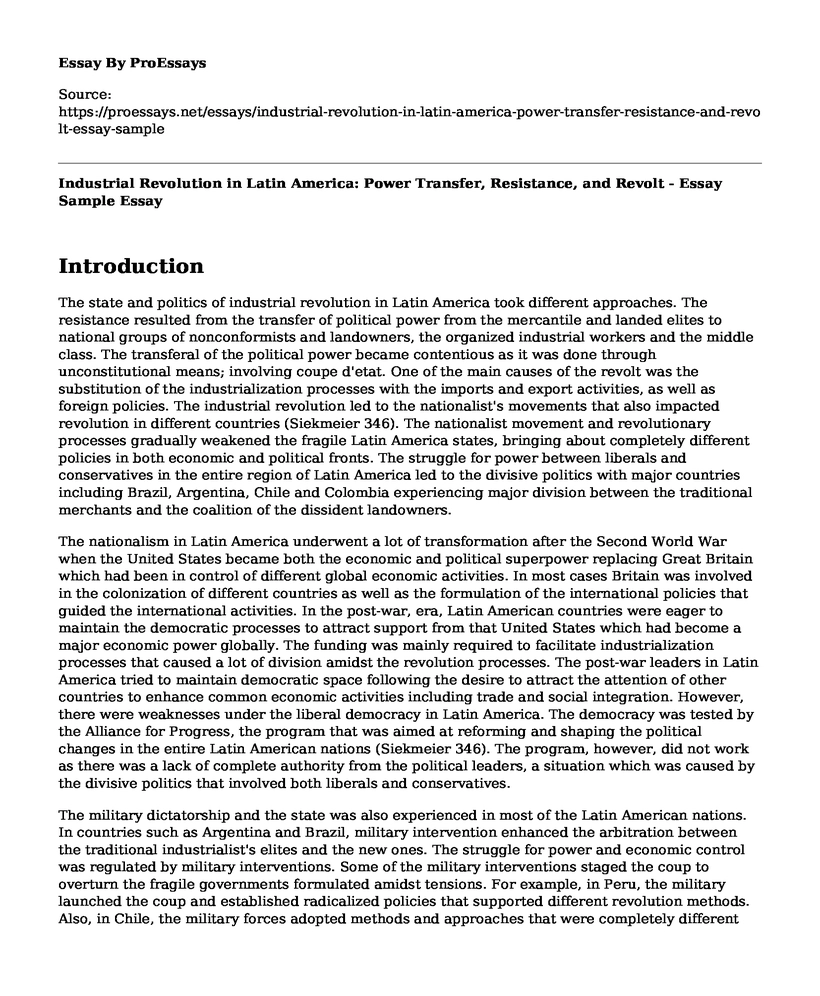Introduction
The state and politics of industrial revolution in Latin America took different approaches. The resistance resulted from the transfer of political power from the mercantile and landed elites to national groups of nonconformists and landowners, the organized industrial workers and the middle class. The transferal of the political power became contentious as it was done through unconstitutional means; involving coupe d'etat. One of the main causes of the revolt was the substitution of the industrialization processes with the imports and export activities, as well as foreign policies. The industrial revolution led to the nationalist's movements that also impacted revolution in different countries (Siekmeier 346). The nationalist movement and revolutionary processes gradually weakened the fragile Latin America states, bringing about completely different policies in both economic and political fronts. The struggle for power between liberals and conservatives in the entire region of Latin America led to the divisive politics with major countries including Brazil, Argentina, Chile and Colombia experiencing major division between the traditional merchants and the coalition of the dissident landowners.
The nationalism in Latin America underwent a lot of transformation after the Second World War when the United States became both the economic and political superpower replacing Great Britain which had been in control of different global economic activities. In most cases Britain was involved in the colonization of different countries as well as the formulation of the international policies that guided the international activities. In the post-war, era, Latin American countries were eager to maintain the democratic processes to attract support from that United States which had become a major economic power globally. The funding was mainly required to facilitate industrialization processes that caused a lot of division amidst the revolution processes. The post-war leaders in Latin America tried to maintain democratic space following the desire to attract the attention of other countries to enhance common economic activities including trade and social integration. However, there were weaknesses under the liberal democracy in Latin America. The democracy was tested by the Alliance for Progress, the program that was aimed at reforming and shaping the political changes in the entire Latin American nations (Siekmeier 346). The program, however, did not work as there was a lack of complete authority from the political leaders, a situation which was caused by the divisive politics that involved both liberals and conservatives.
The military dictatorship and the state was also experienced in most of the Latin American nations. In countries such as Argentina and Brazil, military intervention enhanced the arbitration between the traditional industrialist's elites and the new ones. The struggle for power and economic control was regulated by military interventions. Some of the military interventions staged the coup to overturn the fragile governments formulated amidst tensions. For example, in Peru, the military launched the coup and established radicalized policies that supported different revolution methods. Also, in Chile, the military forces adopted methods and approaches that were completely different from what had been established by the nationalist movements.
Amidst the struggle for the revolution, there was the Marxist challenge that mainly encountered the development of import-substituting industrialization. The success of the Cuban revolution shaped the idea of Marxism in entire Latin America. The above case was supported by incident when Fidel Castro declared himself a Marxist. As a result, the entire Latin American socialist looked after Havana for revolutionary approaches instead of Moscow.
Work Cited
Siekmeier, James F. Latin American Nationalism: Identity in a Globalizing World. , 2017. Internet resource.
Cite this page
Industrial Revolution in Latin America: Power Transfer, Resistance, and Revolt - Essay Sample. (2023, Mar 10). Retrieved from https://proessays.net/essays/industrial-revolution-in-latin-america-power-transfer-resistance-and-revolt-essay-sample
If you are the original author of this essay and no longer wish to have it published on the ProEssays website, please click below to request its removal:
- Bayeux Tapestry, Vikings, Krak Des Chevaliers, and Roman Empire Essay
- Mary Rowlandson's Experience in Captivity Essay
- The Mistreatment of Africans in Nigeria Essay Example
- Article Analysis Essay on "Paraclesis" and "Of Cannibals"
- Essay Example on Pablo Escobar: The Most Notorious Drug Dealer in History
- Essay Example on Kentucky in the Midst of Slavery & Civil War: 1790-1800s
- Essay Sample on Michigan State: A Region of Achievements, Failure, and Calamity







